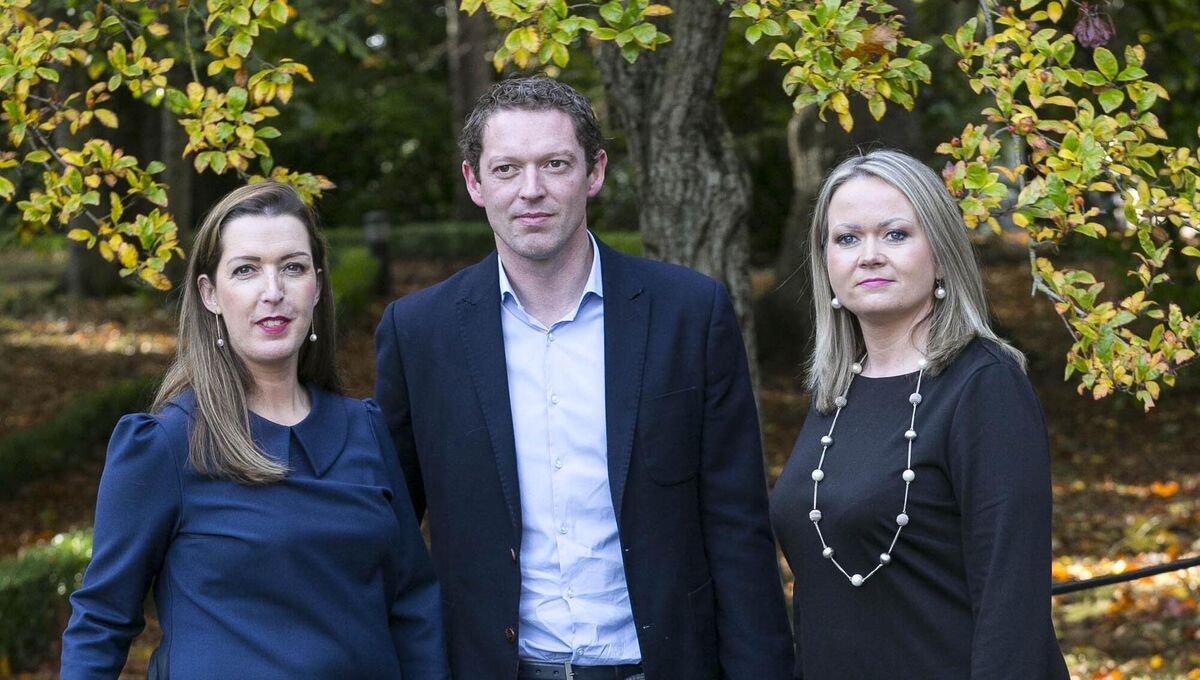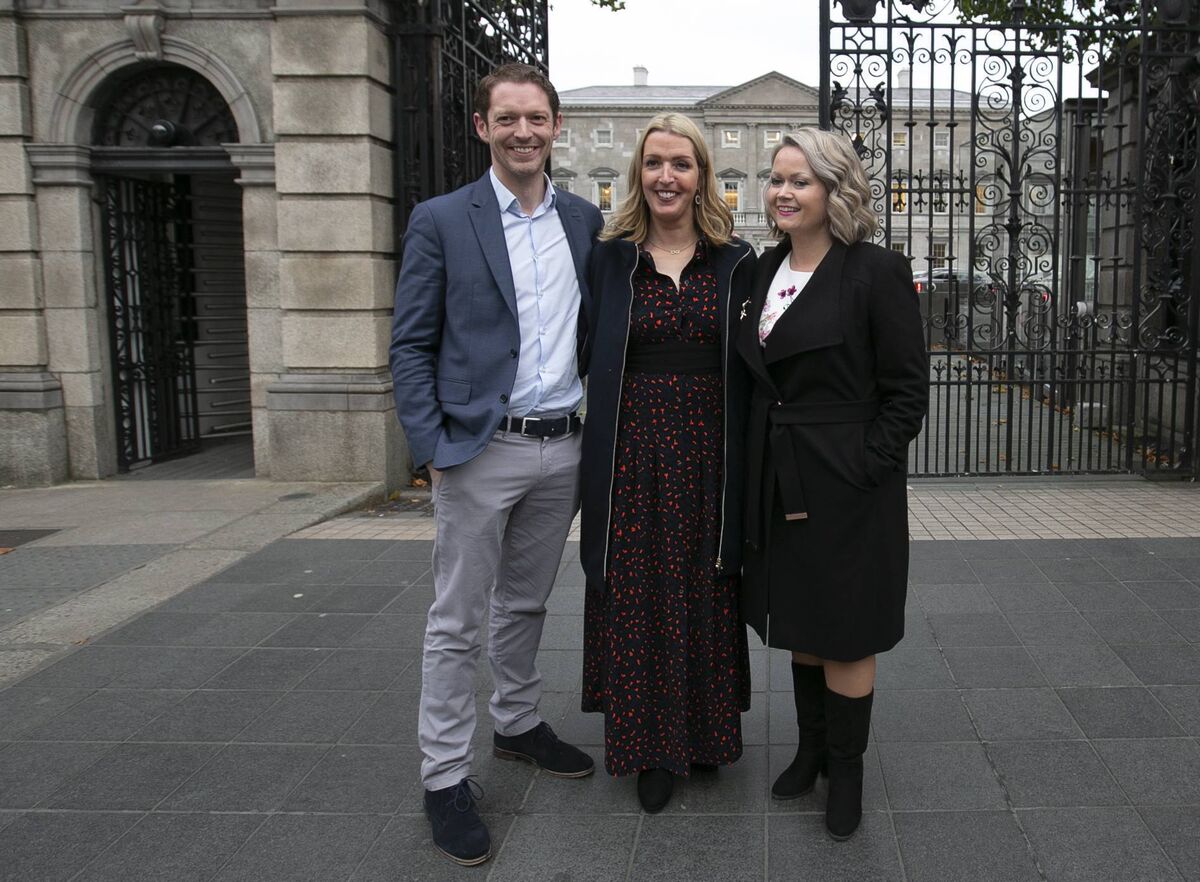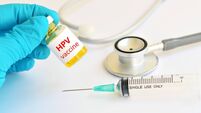221+ group offers support for women like Vicky Phelan who were failed by CervicalCheck

(Centre, left to right) Lorraine Walsh, Stephen Teap, and Vicky Phelan, surrounded by some of the 221 cervical cancer patients who received an incorrect smear test, leaving the Dáil in October 2019 after hearing the Taoiseach apologise to the victims of the CervicalCheck. Picture: Sam Boal/RollingNews.ie
As the news of the CervicalCheck scandal emerged, more and more women discovered they had received incorrect smear test results. There was an urgent need for support.
Three people — Stephen Teap, Lorraine Walsh, and Vicky Phelan — realised they could help, and so 221+ was established in July 2018.
Setting up the group was Stephen Teap’s idea. He recalled how empty he felt when he returned home after discovering the truth about his late wife Irene’s false negative smear results and had no support and very few answers to his questions.
He thought of how other families would go through a similar experience, and that was when the idea of a support group came to him.
They called it 221+ because by this stage it was widely known that 221 women had been affected by the CervicalCheck audits.
However, they kept the plus in place in case this number increased as the investigation into the scandal deepened.

Later, the independent review conducted by the British-based Royal College of Obstetricians and Gynaecologists (RCOG) found that an opportunity to identify cervical cancer in 159 women was missed by CervicalCheck.
The review found a “discordant” result in 308 out of 1,034 smear tests, bringing the total number of affected women to more than 500.
221+ has seven people on its steering committee, including its three founding members. Lorraine Walsh, who was diagnosed with cervical cancer at the age of 34, and Stephen, whose late wife Irene died from the disease in 2017, are involved with the day-to-day running of the group. Due to her illness, Vicky stopped working with 221+ on a daily basis but retained her honorary founding member status.
Rosie Condra, a hospital nurse and one of the 221 women whose smear results were incorrect, has recently joined the 221+ steering group.
The steering committee also has representatives from other relevant organisations, including Donal Buggy from the Irish Cancer Society; Liz Yeates, chief executive of the Marie Keating Foundation; and Stephen McMahon of the Irish Patients’ Association.
The group seeks to provide accurate and timely information regarding the ongoing government inquiries and responses to the CervicalCheck failures and by providing cancer survivorship support. However, it does not provide any legal advice to individuals considering legal action. As well as offering support, the group has also been the leading voice campaigning on the issue of women’s reproductive health since it was set up.
Covid-19 affected the support group, just like it affected most organisations and charities. 221+ cancelled all of its events in light of the health risk the pandemic posed.

Northern Irish physician Dr Gabriel Scally, who conducted the scoping inquiry into the controversy, nominated Stephen and Lorraine as patient representatives for a government steering committee on CervicalCheck reforms. Then health minister Simon Harris appointed them to the positions.
The committee’s purpose is to provide oversight and assurance on the implementation of key decisions taken by the Government in relation to CervicalCheck. However, Lorraine resigned from the committee in December 2019 due to what she described as “inaccuracies” in the review by RCOG.
Speaking after her resignation, she said she “absolutely” did not have confidence in the process of reviewing women’s smear tests, and as an advocate, she could not say to other affected women that they should have confidence in the process.
Stephen continues to be a member of the committee as a representative of 221+. The group believes the CervicalCheck Steering Committee is important to ensure the recommendations outlined in Dr Scally’s report are fully implemented.
The independent statutory tribunal into claims relating to CervicalCheck was announced by Government in December 2018. The CervicalCheck Tribunal Act 2019 was signed into law in July 2019 and is chaired by Ms Justice Ann Power. The tribunal’s purpose is to hear and determine claims in respect of CervicalCheck outside of the court process and to facilitate restoration of trust meetings, which seek to allow affected women to document their experiences and facilitate discussion.
The tribunal was established on October 27, 2020, but it hasn’t been plain sailing.

In November 2020, 221+ pulled out of talks with the tribunal after it became clear that some of their concerns, mostly around the recurrence of cancer, were not going to be addressed.
In a statement at the time, the group said it had written to the health minister to “end exchanges in respect of the CervicalCheck Tribunal and express our utter frustration at the pointless waste of time that has been the past three weeks”.
The group’s position has not changed on the matter since then. They say that the tribunal, as it was presented to them last year, was not fit for purpose and that nothing has changed in the intervening year to alter their view.
The most recent figures from September 2021, show that the number of claims against the State arising out of the CervicalCheck scandal has reached 310, including 38 on behalf of women who have already died. By comparison, eight claims have been notified to the CervicalCheck tribunal set up by the State as an alternative to court.
The support group is publically funded for the lifetime of the current government, which means it will exist in its current format until at least 2024.
So what is next for 221+? It is currently in the process of developing a strategy to outline how it will continue to work, which they intend to publish before year end.
In the meantime, it will continue to support the affected women, advocate for the supports for women affected by gynaecological cancer, and encourage the uptake of screening and the HPV vaccine.
























